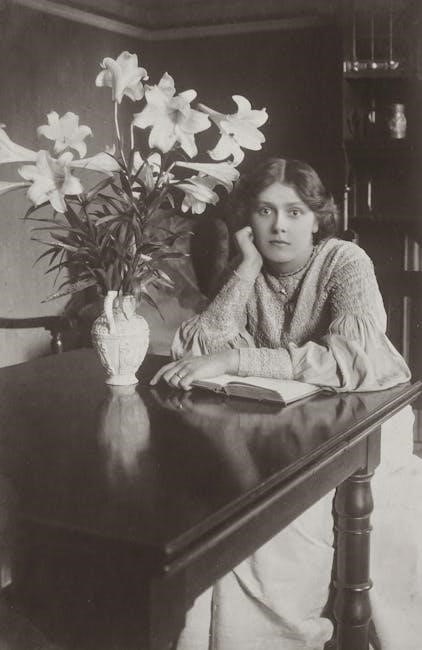Explore the profound themes of intelligence‚ identity‚ and humanity in Daniel Keyes’ iconic novel through guided questions. These questions delve into Charlie’s transformation‚ ethical dilemmas‚ and societal reflections‚ fostering deeper understanding and critical thinking.
Overview of the Novel and Its Significance
Daniel Keyes’ Flowers for Algernon is a groundbreaking novel that explores themes of intelligence‚ identity‚ and humanity through the journey of Charlie Gordon‚ a man with intellectual disabilities. The story delves into Charlie’s transformation after undergoing an experimental surgery to enhance his intelligence‚ raising profound ethical questions about scientific intervention and human dignity. The novel’s significance lies in its emotional depth‚ highlighting the complexities of human potential and societal attitudes toward disability. Keyes’ work remains a powerful commentary on what it means to be human‚ resonating with readers for generations.
Purpose of Guided Reading Questions
Guided reading questions for Flowers for Algernon are designed to deepen students’ understanding of the novel’s themes‚ characters‚ and moral dilemmas; These questions encourage critical thinking‚ analysis‚ and reflection on key aspects of the story‚ such as Charlie’s transformation‚ the ethics of scientific experimentation‚ and the exploration of identity. By prompting students to engage with the text actively‚ these questions help them connect the narrative to broader societal issues‚ fostering a richer appreciation of the novel’s emotional and intellectual depth. They also serve as a tool to assess comprehension and inspire meaningful discussions.

Plot Summary and Key Events
Charlie Gordon‚ a man with intellectual disabilities‚ undergoes an experimental surgery to enhance his intelligence. The procedure initially succeeds‚ transforming him into a genius‚ but it ultimately reverses‚ highlighting the fragility of human enhancement.
Charlie’s Selection for the Experiment
Charlie Gordon‚ a man with intellectual disabilities‚ is chosen for a groundbreaking cognitive enhancement experiment due to his eagerness to learn and please others. His simple job as a janitor and attendance in night classes demonstrate his motivation. Dr. Strauss and Professor Nemur select him because his low intelligence provides a clear baseline for measuring the experiment’s success. Charlie’s desire to become “smart” and his innocent nature make him an ideal candidate‚ unaware of the risks involved. His selection sets the stage for the ethical and emotional journey that unfolds.
The Experiment and Its Impact on Charlie
The experiment involves a surgical procedure aimed at tripling Charlie’s intelligence. Initially‚ Charlie experiences rapid cognitive growth‚ surpassing expectations. He learns complex concepts and develops emotionally‚ forming deeper connections. However‚ the effects are temporary‚ and Charlie’s intellect begins to decline. This regression is emotionally devastating‚ as he grasps the fleeting nature of his newfound intelligence. The experiment highlights the ethical dilemmas of scientific intervention and the human cost of playing with nature. Charlie’s transformation and subsequent regression serve as a poignant exploration of humanity‚ intelligence‚ and the consequences of tampering with the human mind.
Charlie’s Intellectual Progression
Charlie’s intellectual journey begins with his selection for the experiment‚ marking a pivotal transformation. Initially‚ his cognitive abilities improve dramatically‚ showcasing his capacity for growth. As the story progresses‚ Charlie’s articulation and understanding of complex ideas become more sophisticated. However‚ his development is not without challenges‚ as he struggles to reconcile his newfound intelligence with his past experiences. This progression highlights themes of human potential and the ethical implications of scientific intervention‚ ultimately leading to a deeper exploration of what it means to be intelligent and human.
Themes in Flowers for Algernon
The novel explores themes of human potential‚ identity‚ and societal ethics‚ raising questions about intelligence and its impact on human connections and self-perception.
The Theme of Intelligence and Human Potential
The novel examines the complexities of intelligence and its impact on human life. Charlie’s transformation from a low-IQ individual to a genius highlights the potential of human cognition. However‚ his eventual decline raises questions about the ethics of scientific intervention and the transient nature of intellectual enhancement. The story challenges readers to consider whether intelligence defines a person’s worth and whether emotional depth can coexist with intellectual brilliance. This theme underscores the delicate balance between human potential and the consequences of manipulating it‚ leaving a profound reflection on society’s perception of intelligence.
The Theme of Identity and Self-Discovery
Charlie’s journey in Flowers for Algernon profoundly explores identity and self-discovery. Initially‚ Charlie seeks acceptance and validation through his desire to become smarter. As his intelligence grows‚ he uncovers hidden memories and emotions‚ revealing a deeper sense of self. His evolving understanding of his past and relationships challenges his perception of who he is. The novel highlights the struggle between intellectual growth and emotional identity‚ showing how Charlie’s quest for self-discovery ultimately defines his humanity; This theme emphasizes the importance of understanding oneself beyond surface-level traits‚ resonating deeply with readers.
The Theme of Society’s Treatment of the Intellectually Disabled
The novel critically examines society’s treatment of intellectually disabled individuals‚ reflecting both pity and exploitation. Charlie’s initial experiences reveal a lack of genuine understanding and empathy from those around him. His coworkers mock him‚ and even his teachers fail to see his potential beyond superficial kindness. The experiment itself raises ethical questions about exploiting vulnerable individuals for scientific gain. Through Charlie’s journey‚ the novel highlights the dehumanizing effects of societal indifference and the importance of treating all individuals with dignity‚ regardless of their intellectual abilities.

Symbolism in the Novel
Algernon the mouse‚ flowers‚ and mazes symbolize Charlie’s journey‚ representing human potential‚ fleeting beauty‚ and the complexity of intelligence‚ reflecting deeper themes of transformation and loss.
Symbolism of Algernon the Mouse
Algernon‚ the intelligent mouse‚ symbolizes Charlie’s potential and the ethical dilemmas of scientific experimentation. Both undergo similar procedures‚ with Algernon’s decline foreshadowing Charlie’s fate. Their shared journey highlights the transient nature of enhanced intelligence and the consequences of human intervention. Algernon also represents the pursuit of knowledge and the blurred lines between human and animal intelligence. Through Algernon’s character‚ Keyes critiques the exploitation of the vulnerable for scientific progress‚ mirroring Charlie’s struggles. This duality underscores the novel’s exploration of humanity‚ ethics‚ and the fragility of intellectual advancement.
Symbolism of Flowers in the Title
The flowers in the title symbolize growth‚ hope‚ and the fleeting nature of beauty. They represent Charlie’s desire for transformation and his ultimate realization of life’s fragility. The flowers also signify the transient impact of the experiment‚ as Charlie’s intellectual bloom is short-lived. This imagery contrasts with Algernon’s decline‚ emphasizing the tragic paradox of scientific advancement. The flowers evoke empathy‚ reflecting Charlie’s simple yet profound appreciation for life’s small joys‚ despite his circumstances. Their presence underscores the novel’s themes of human potential and the inevitability of loss.
Symbolism of the Maze and Intelligence Tests
The maze and intelligence tests symbolize the pursuit of human potential and the measurement of cognitive abilities. Charlie’s ability to navigate the maze reflects his growing intellect and problem-solving skills‚ while Algernon’s performance serves as a benchmark for scientific comparison. These tests highlight the tension between innate intelligence and artificial enhancement‚ questioning the ethics of manipulating human cognition. The maze also represents Charlie’s internal struggle to prove his worth‚ mirroring his journey of self-discovery. Ultimately‚ the tests underscore the novel’s exploration of what it means to be intelligent and human.

Key Questions and Answers
Discover essential insights into Charlie’s journey‚ the experiment’s purpose‚ and Algernon’s role. These questions and answers provide clarity on the novel’s core themes and character motivations.
Why Was Charlie Chosen for the Experiment?
Charlie Gordon was selected for the experiment due to his low IQ‚ making him an ideal candidate to test the effectiveness of the intelligence-enhancing procedure. His eagerness to improve his cognitive abilities and his vulnerable position as a person with intellectual disabilities made him a suitable subject for Dr. Strauss and Dr. Nemur. Additionally‚ his willingness to participate and the potential for significant observable changes in his intelligence level aligned with the experiment’s goals. Charlie’s motivation stemmed from his desire to become “smart” and gain acceptance‚ making him a prime candidate for the procedure.
What Motivates Charlie to Participate in the Study?
Charlie’s primary motivation stems from his deep desire to overcome his intellectual limitations and become “smart.” His job as a janitor and his simplistic life fuel his longing for respect and understanding. The prospect of the experiment offers him hope for self-improvement and societal acceptance. Additionally‚ Charlie’s trust in Dr. Strauss and Dr. Nemur‚ who present the procedure as a groundbreaking opportunity‚ influences his decision. His eagerness to prove himself and escape his mundane life drives him to participate‚ believing the experiment will transform his existence and grant him the intelligence he yearns for.
What Is the Significance of Algernon in the Story?
Algernon‚ the intelligent mouse‚ serves as both a symbol and a scientific benchmark in the novel. As the first successful subject of the IQ-enhancing experiment‚ Algernon represents the potential and risks of the procedure. His abilities and eventual decline mirror Charlie’s transformation‚ foreshadowing the transient nature of the experiment’s effects. Algernon’s role underscores the ethical implications of scientific experimentation on living beings‚ while also highlighting the emotional connection Charlie forms with him. Through Algernon‚ Keyes critiques the objectification of intelligence and the consequences of manipulating nature for human advancement.

Critical Analysis and Reflection
Daniel Keyes’ novel sparks reflection on ethics‚ identity‚ and society’s treatment of the intellectually disabled‚ inviting readers to ponder the consequences of scientific hubris and human vulnerability.
Ethical Implications of the Experiment
The experiment on Charlie raises significant ethical concerns‚ particularly regarding human experimentation and informed consent. Charlie‚ with his limited understanding‚ agrees to the procedure without fully grasping its risks. The scientists’ focus on scientific progress over Charlie’s well-being highlights the moral ambiguity of their actions. The novel critiques the exploitation of vulnerable individuals for research‚ questioning the ethics of tampering with human intelligence. The temporary nature of the experiment’s success further underscores the consequences of prioritizing scientific advancement over human welfare‚ leaving Charlie emotionally and psychologically devastated.
The Emotional Journey of Charlie Gordon
Charlie’s emotional journey in Flowers for Algernon is a heart-wrenching exploration of hope‚ transformation‚ and despair. Initially‚ Charlie’s desire for acceptance and intelligence drives his enthusiasm for the experiment. As his intellect grows‚ so does his self-awareness‚ leading to moments of joy and pride. However‚ the realization that his newfound intelligence is temporary devastates him‚ evoking profound sadness and fear. His eventual regression leaves him isolated‚ longing for the connections he once made. Charlie’s story underscores the emotional cost of scientific experimentation and the fragility of human dignity‚ resonating deeply with readers.
The novel’s message emphasizes the balance between scientific progress and ethical responsibility‚ urging readers to reflect on humanity’s treatment of intelligence and disability with compassion and empathy.
Final Thoughts on the Novel’s Message
Daniel Keyes’ Flowers for Algernon delivers a poignant exploration of human potential‚ ethics‚ and identity. Charlie’s journey highlights the consequences of scientific hubris and the fragility of human intelligence. The novel challenges readers to reflect on society’s treatment of intellectually disabled individuals‚ emphasizing the importance of empathy and understanding. Through Charlie’s emotional and intellectual transformation‚ Keyes underscores the value of human connection and the ethical dilemmas inherent in scientific progress. The story remains a powerful cautionary tale‚ urging readers to embrace diversity and question the boundaries of human intervention in nature.
Relevance of the Novel in Modern Contexts
Flowers for Algernon remains a timely and thought-provoking novel in contemporary discussions. Its themes of genetic engineering‚ AI‚ and neurodiversity resonate with modern ethical debates. The story challenges readers to consider the consequences of scientific advancements and their impact on human identity. Charlie’s journey mirrors ongoing conversations about inclusivity‚ disability rights‚ and the ethical use of technology. Keyes’ exploration of intelligence and humanity offers a powerful lens for understanding today’s societal complexities‚ making the novel a timeless reflection of human values and scientific responsibility.